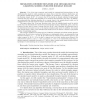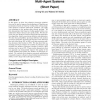165 search results - page 28 / 33 » Teaching Randomized Learners |
118
click to vote
CE
2008
15 years 2 months ago
2008
E-Science has the potential to transform school science by enabling learners, teachers and research scientists to engage together in authentic scientific enquiry, collaboration an...
136
click to vote
FOCS
1990
IEEE
15 years 6 months ago
1990
IEEE
Two of the most commonly used models in computational learning theory are the distribution-free model in which examples are chosen from a fixed but arbitrary distribution, and the ...
101
Voted
ATAL
2008
Springer
15 years 4 months ago
2008
Springer
In this paper, we show how adaptive prototype optimization can be used to improve the performance of function approximation based on Kanerva Coding when solving largescale instanc...
121
Voted
IROS
2006
IEEE
15 years 8 months ago
2006
IEEE
Abstract— A system is detailed here for using imitation learning to teach a robot to grasp objects using both hand and wholebody grasps, which use the arms and torso as well as h...
112
click to vote
JCP
2008
15 years 2 months ago
2008
This paper presents a successful lab simulation experience to teach signal modulation and demodulation concepts in communication and computer networks to computer science and compu...


